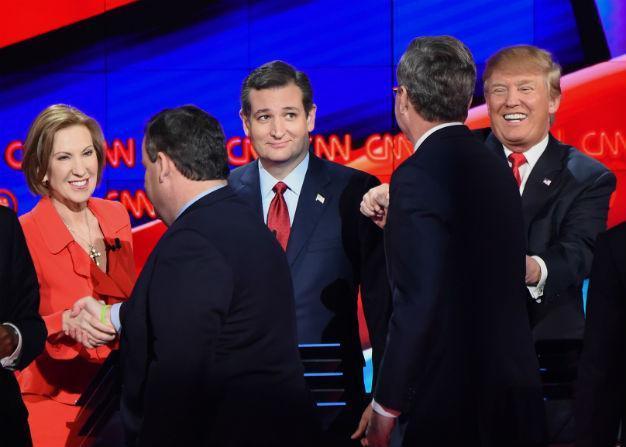Trump defends call for banning Muslims from United States
LAS VEGAS - The Associated Press

Republican presidential candidates (L-R) Carly Fiorna, Chris Christie, Ted Cruz, Jeb Bush and Donald Trump (R) interact on stage at the end of the Republican Presidential Debate, hosted by CNN, at The Venetian Las Vegas on December 15, 2015 in Las Vegas, Nevada. AFP photo
Republican front-runner Donald Trump defended his provocative call for banning Muslims from the United States in Dec. 15 night's presidential debate as the candidates pushed their own plans for fighting Islamic State of Iraq and the Levant (ISIL) militants.The debate was dominated by national security, reflecting the reshaping of the 2016 presidential contest by the recent attacks in Paris and San Bernardino, California. Hours before the debate began, officials in Los Angeles closed all schools after an emailed threat that was later deemed a hoax.
Trump insisted his proposal, which was roundly condemned by his rivals, wasn't an attempt to discriminate.
"We are not talking about isolation, we're talking about security," he said. "We are not talking about religion, we are talking about security."
Former Florida Gov. Jeb Bush dismissed Trump's proposal as unserious, saying, "Donald is great at the one-liners, but he's a chaos candidate and he'd be a chaos president." But Texas Sen. Ted Cruz and Florida Sen. Marco Rubio said they understood why Trump had raised the idea and avoided directly criticizing the front-runner.
Instead, the two senators debated at length their differences over government surveillance programs. Rubio has accused Cruz of weakening the government's ability to track terrorists because he voted in favor of legislation to eliminate the National Security Agency's bulk phone-records collection program and replace it with a more restrictive effort to keep the records in phone companies' hands.
Cruz insisted the new law gives the government more access to cellphones and other technology that terrorists are more likely to use - a contention Rubio disputed.
"There is nothing we are allowed to do under this bill that we were not allowed to do before," Rubio said.
Beginning after the Sept. 11, 2001, terror attacks, the NSA secretly collected the daily calling records - but not contents of conversations - for most Americans, including people never suspected of any crime.
A new law, called the USA Freedom Act, passed in June with broad, bipartisan support. It ordered the NSA to end bulk collection after a six-month transition that expired last week.
Cruz and Rubio have been sparring from afar over national security for weeks. The Texas senator is on the rise, particularly in Iowa's leadoff caucuses, where he's challenging Trump's months-long lead.
"Donald is great at the one-liners, but he's a chaos candidate and he'd be a chaos president," former Florida Gov. Jeb Bush said as the fifth Republican presidential debate opened in Las Vegas.
Florida Sen. Marco Rubio said of Trump's proposal, "It isn't going to happen."
Trump insisted he wasn't seeking to discriminate against Muslims.
"We are not talking about isolation, we're talking about security," he said. "We are not talking about religion, we are talking about security."
Tuesday's debate was the first for Republicans since the attacks in Paris and San Bernardino, California, that increased concerns about terrorism in the United States. Hours before the debate was to begin, officials in Los Angeles closed all schools after an emailed threat that was later deemed a hoax.
Security fears have reshaped the presidential race, though outsiders like Trump continue to dominate the Republican contest. The billionaire is facing a new challenge from Texas Sen. Ted Cruz, who has been rising in polls, particularly in Iowa, which holds its leadoff caucuses on Feb. 1.
Cruz, along with Rubio, said he understood why Trump had made his proposal for banning Muslims, and he avoided directly criticizing the front-runner. Cruz said he believes a more narrowly focused approach would more effectively target Islamic militants.
"It's not a war on a faith," he said.
















